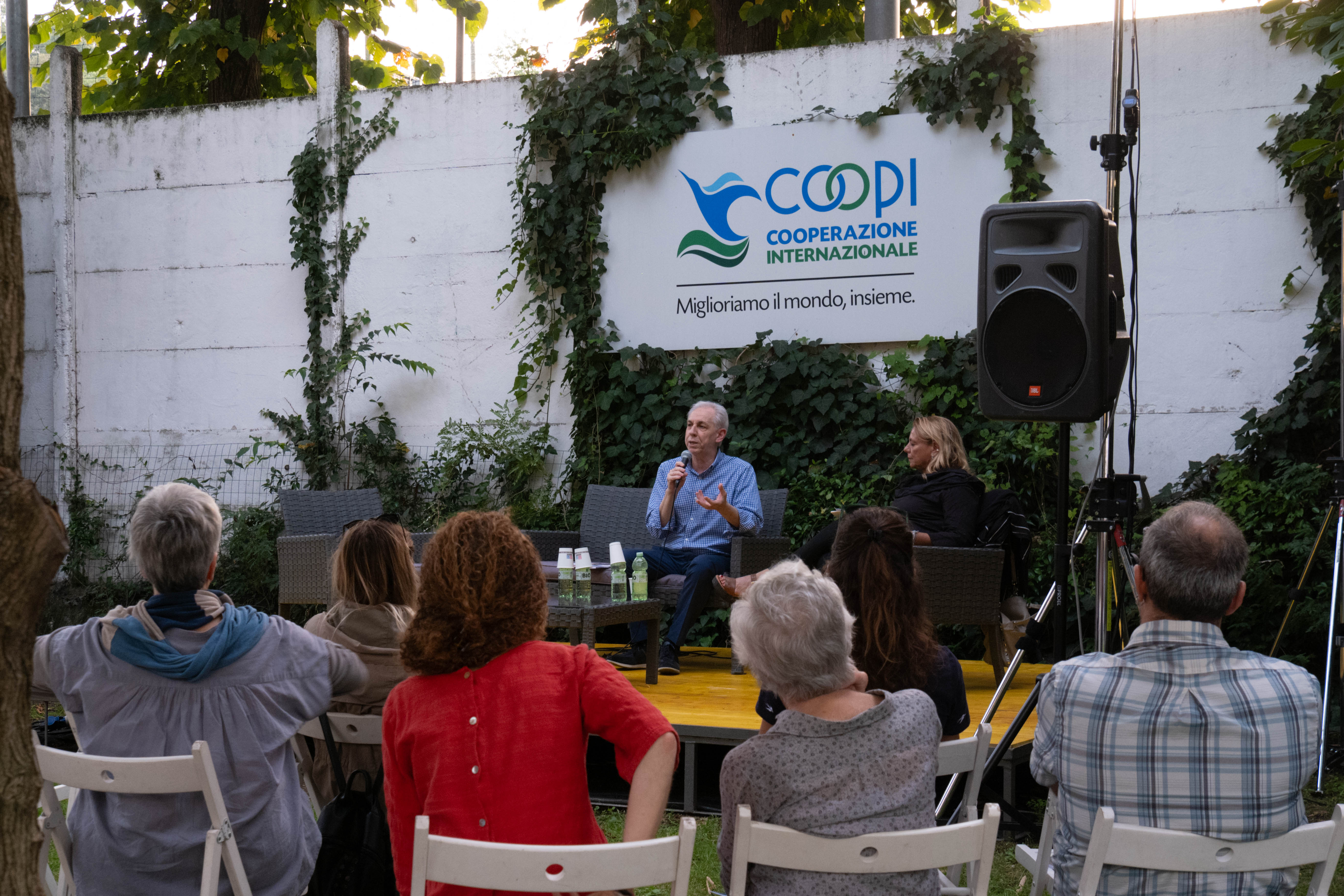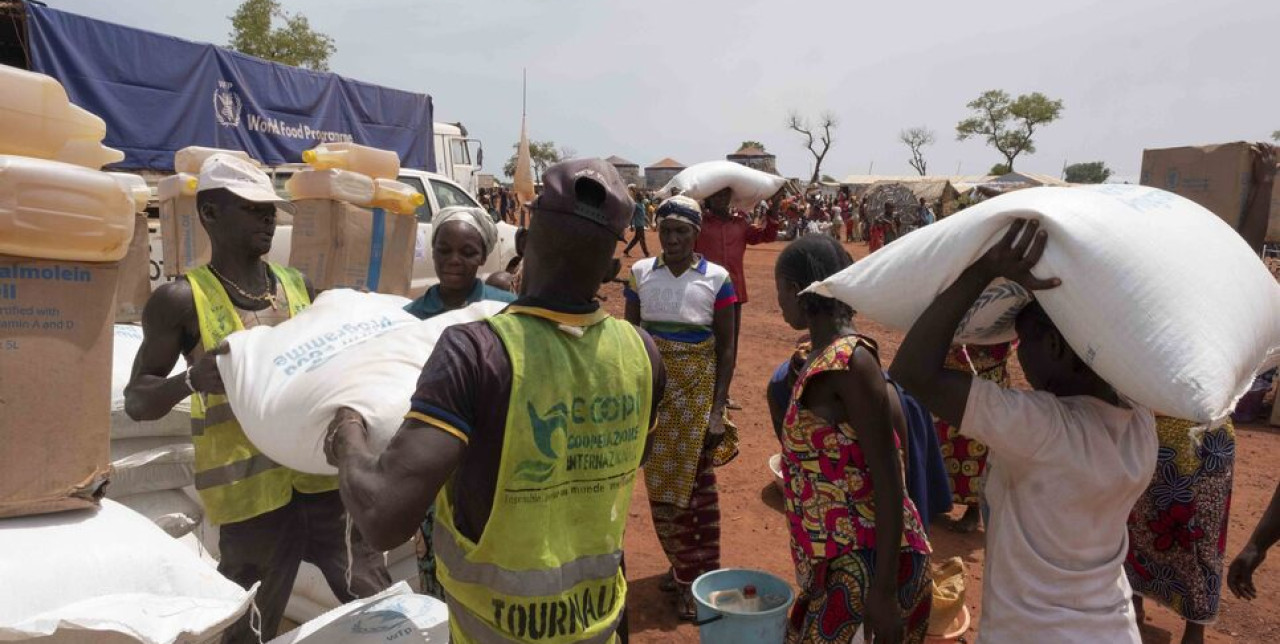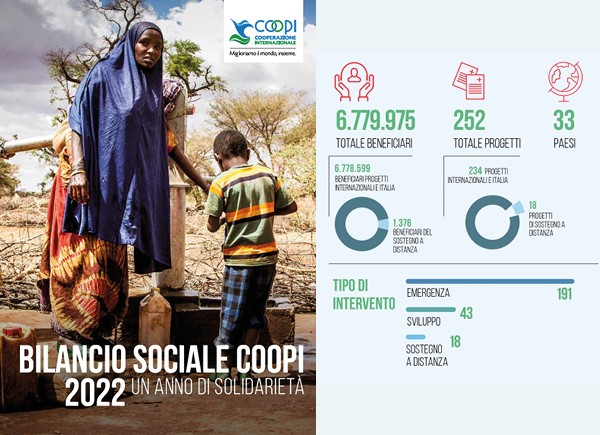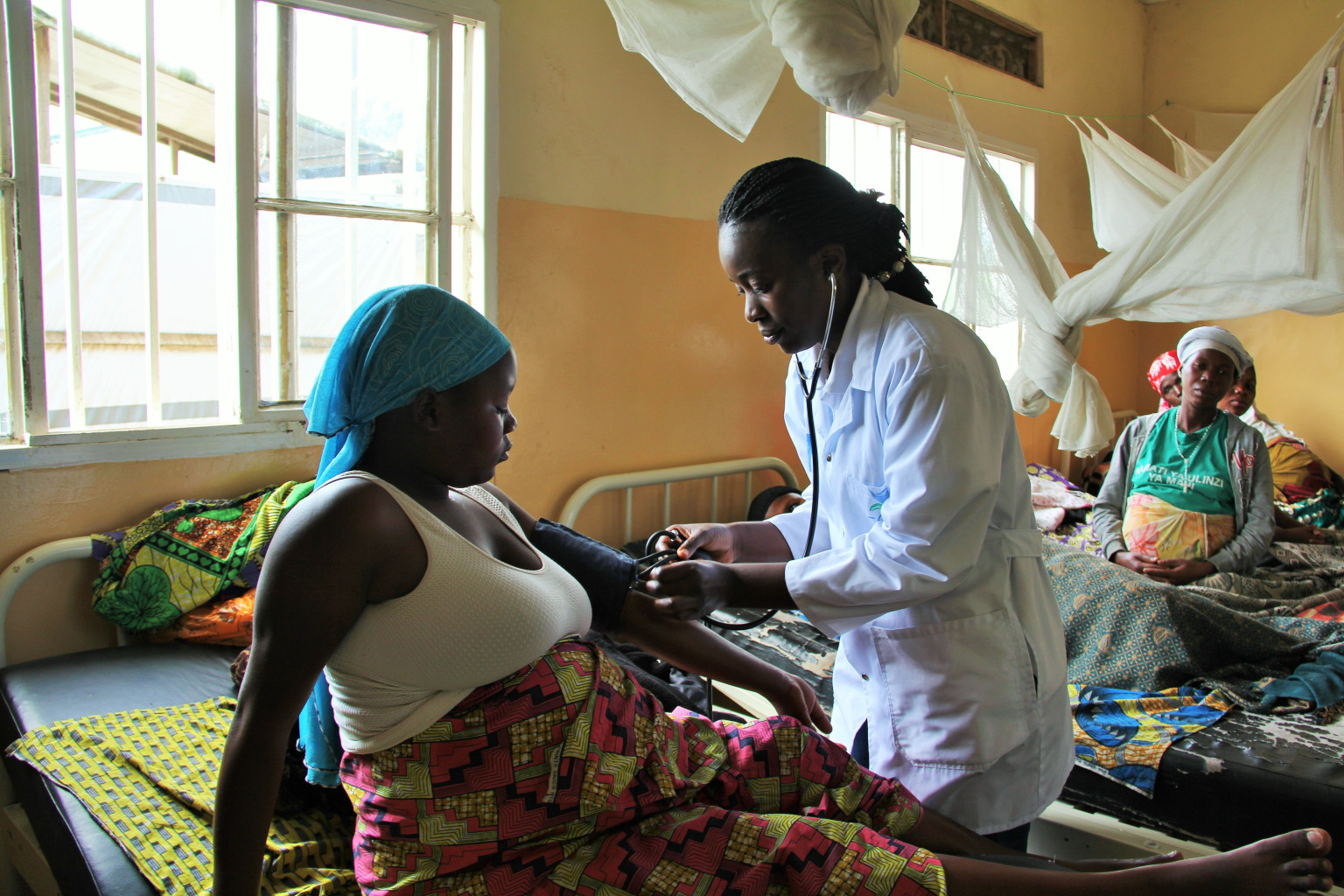03-10-2023 | di COOPI
Increasing number of humanitarian crisis and COOPI's response
The increasing numbers of crises between 2022 and 2023, due to the effects of climate change, natural hazards and wars, have thrown into disarray dozens of countries around the world. In the past year alone, 270,000 people were killed by 387 old and new wars or disasters resulting from natural phenomena. A record figure that is likely to be confirmed, or even worsen, in the current year.
The dramatic scenario was described in Milan at the presentation of the Annual Report of the historic humanitarian organization COOPI - Cooperazione Internazionale. Ennio Miccoli, Director of COOPI. said:
We are facing a very difficult historical period for cooperation, with the rising and overlapping of sudden and "chronic" emergencies, often affecting countries already in dire straits. Thus COOPI moved its interventions especially on emergencies.

Ennio Miccoli, director, in occasion of the event COOPI Cascina Aperta, September 30, 2023.
The United Nations estimate that in 2023 there will be 339 million people in need of humanitarian assistance: a major jump from 2022, when there had been 274 million, the largest number in 30 years. COOPI, in response to the new needs, is increasingly committed to emergencies with 191 projects out of a total of 252. In 2022 it supported a total of 6.8 million people in 33 countries including Africa, the Middle East, Latin America and the Caribbean, and Italy.
Increasing climate crisis
In 2022, a total of 387 environmental disasters affected 185 million people and caused more than 30 thousand deaths, more than half (16 thousand) related to heat waves in Europe, which corresponds to a number three times worse than in 2021. The disasters resulted in the forced migration of more than 32 million people, the highest number in a decade and 41% more than the average of the previous ten years. To put that in perspective, between 1970 and 2021 there were nearly 12 thousand climate shocks: 2 million fatalities, 90 % occurring in developing countries. The increase in number and violence of climate disasters also indicates that 1.2 billion people could be displaced in the next 30 years.
Record war-related deaths
The year 2022 also recorded the highest number of war-related deaths - more than 237 thousand - since 1994, due mainly to increased violence in Ethiopia and Ukraine. In 2022 there were 55 active armed conflicts between states in 38 countries, in addition to other 82 conflicts of different origins. Already in 2021, the year prior to the Russian invasion of Ukraine, the number of casualties related to armed conflicts had increased by 45% since 2020 - more than 100,000 - reversing the downward trend that had been continuing for five years after the record number of deaths related to the civil war in Syria in 2014. Over the past 15 years, the world has become less peaceful: of the 163 countries covered by the Global Peace Index, in as many as 95 the situation has worsened.
In search of a safe life, within and across borders
Emergencies push people to flee and seek places where they can live rather than survive. Considering the at least 280 million international migrants, the vast majority (75%) find shelter in low and middle-income countries, while only 24% in high-income countries, and 70% settle in nations bordering the one of departure.
In 2022, more than 108 million people were forced to leave their homes worldwide, a record figure considering the increase by 19 million in just one year.
Numbers grew by 35% for refugees and asylum seekers, totaling 9 million in 2022, and pushing the overall number to 35 million. Turkey hosts the largest number (3.6 million), followed by Iran (3.4 million), Colombia (2.5 million), Germany (2.1 million) and Pakistan (1.7 million). Europe (including Turkey) hosts 12.4 million refugees, Asia-Pacific nearly 7 million, almost all in Iran, Pakistan and Bangladesh, while the Americas host 6 million. In Sub-Saharan Africa there are 7 million, in the Middle East and North Africa 2.4 million. In 2022, almost 304 thousand people arrived in Italy, of whom less than 174 thousand came from Ukraine.
The number of internally displaced persons also set a record in 2022: more than 71 million people, 20% more than the previous year, an unprecedented figure. The amount of people fleeing conflict and violence doubled to over 28 million, touching 62 million, while those fleeing for disasters were nearly 9 million. Nearly two-thirds of the total are in 10 countries in the Middle East, Africa and South America, with the only European exception being Ukraine.
COOPI's response to emergencies
COOPI is currently involved in the world's major humanitarian emergencies: the Syrian crisis, the Venezuelan crisis, in West Africa, the Horn of Africa and Sudan, and in Central Africa. In Italy, a project to tackle growing poverty is active.
Middle East and North Africa. COOPI intervenes in Syria, Iraq, Lebanon, Jordan, Libya and Tunisia, all countries facing complex emergencies, with 35 projects supporting 286,000 people. The organization works particularly in Syria and in those countries affected by the Syrian crisis, the most serious crisis in the world in terms of numbers of displaced people (13 million within and outside the country). Due to the February 2023 earthquake, COOPI promptly diversified its action by helping more than 40,000 people in the most affected areas (Aleppo and Hama).
Latin America and the Caribbean. In 2022, COOPI increased its intervention in Venezuela, a country that has been hit by a complex crisis, forcing 7 million people out of the country and driving 65 % of the remaining families into poverty. The Venezuelan crisis is the most serious internal exodus and humanitarian crisis in modern Latin American history. It has involved several neighboring countries including Peru and Ecuador, where the NGO has been working for years. Altogether, counting its presence in Bolivia, Guatemala, Haiti, Paraguay and Colombia, COOPI has implemented 40 projects in the area, helping 337,000 people.
Western Africa. COOPI is active in Niger, Nigeria, Mali, Burkina Faso, Mauritania, Senegal, Sierra Leone, and Gambia. In the Sahel countries in particular, instability and violence have left more than 30 million people in need of humanitarian assistance. Here the organization is responding with 57 projects implemented in 2022, serving 2.8 million people, with a multi-sectoral approach (health, food security, nutrition, water and sanitation, protection, education).
Eastern and Southern Africa. In the region, COOPI intervenes with 68 projects, supporting 2.4 million people, in Ethiopia, Malawi, Somalia, Sudan and Uganda. In the Horn of Africa, 36 million people are in need of humanitarian assistance due to conflict, political instability, the effects of climate change and extreme natural phenomena. The area has plunged into a growing emergency since the outbreak of conflict in April 2023 in Sudan. Here, COOPI has been present since 2004 and today provides aid to 35,000 displaced people on the border with Ethiopia and an equal number of refugees in Chad on the border with Darfur.
Central Africa. In a complex crisis fueled by political instability, armed groups and crime, poverty, hunger and epidemics, and natural hazards, 36 million people are in need of humanitarian assistance and 8 million people are displaced/refugees. COOPI, active since 1974 in the Central African Republic and since 1977 in the Democratic Republic of Congo, works with 51 projects supporting one million people.
Efforts against poverty in Italy also continue: in August 2022, 450 families were helped, nearly 20% more than the previous year. The amount of food aid distributed has also increased, because by August 2022 the figure for the entire previous year had already been reached. Over the past year, a total of about 45 tons of food was distributed.
Cover photo: Central African Republic, 2019, ph Silvano Pupella
Photo in text: ph Margherita Monti




 Chad
Chad

